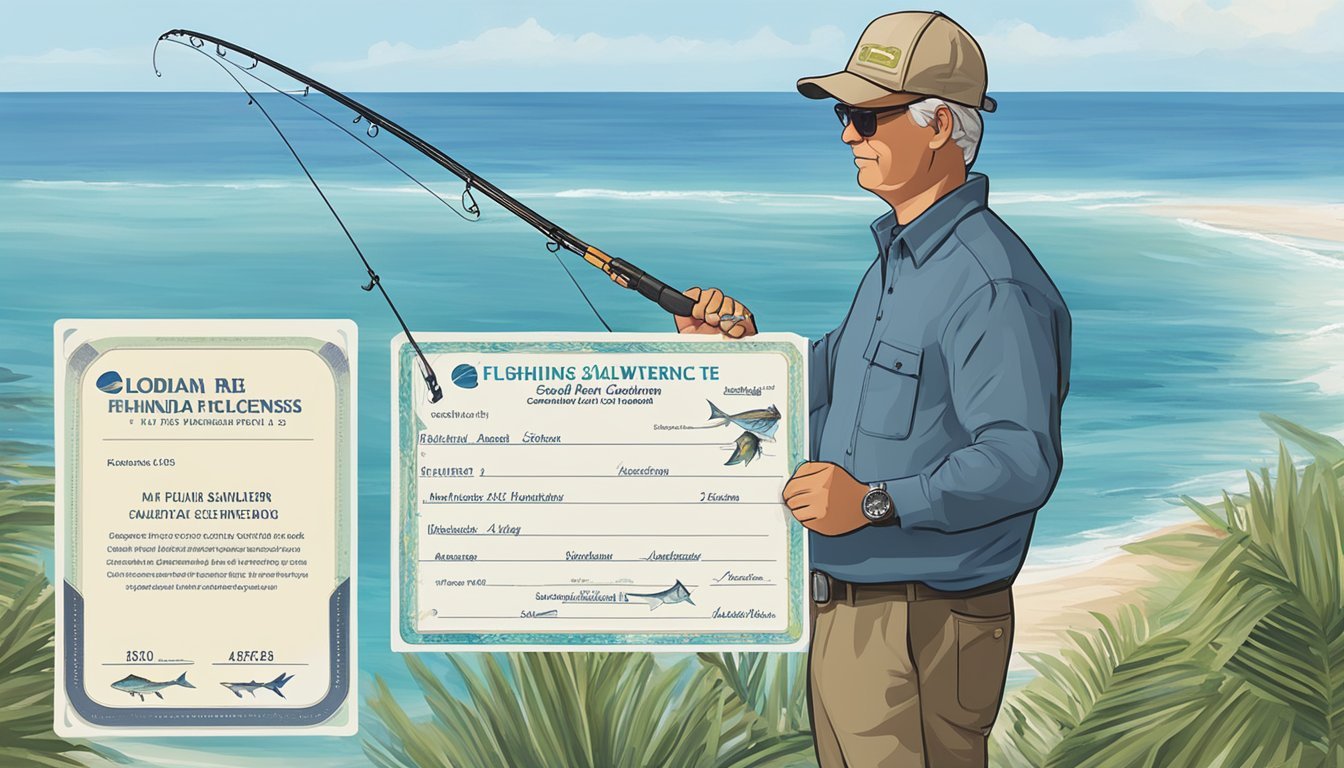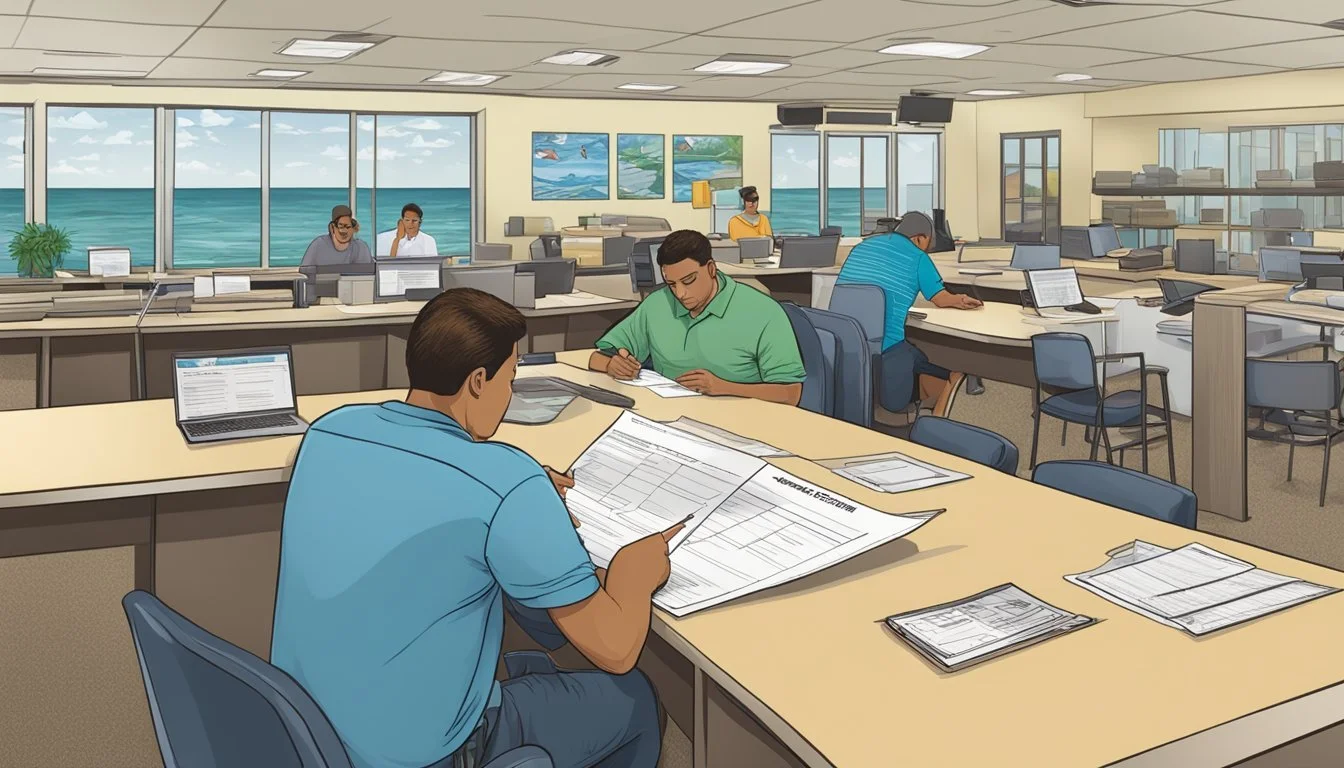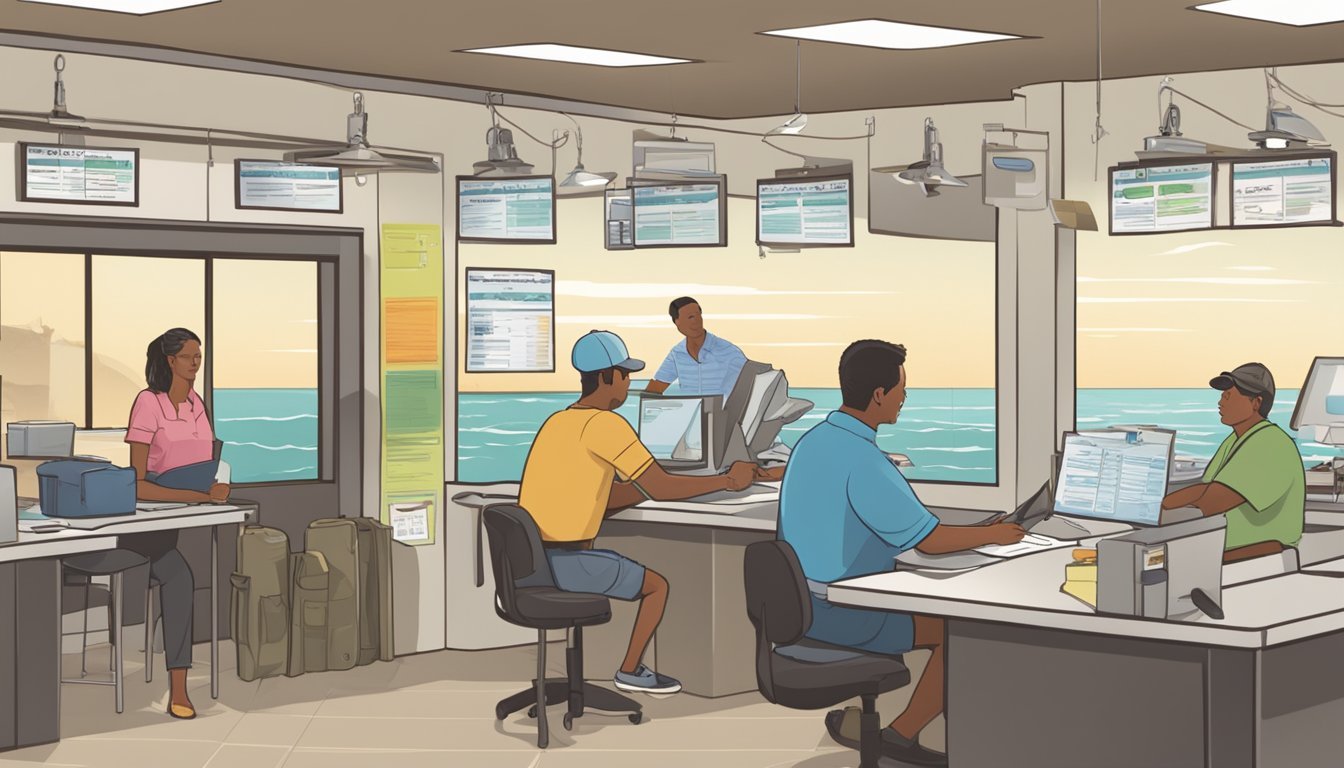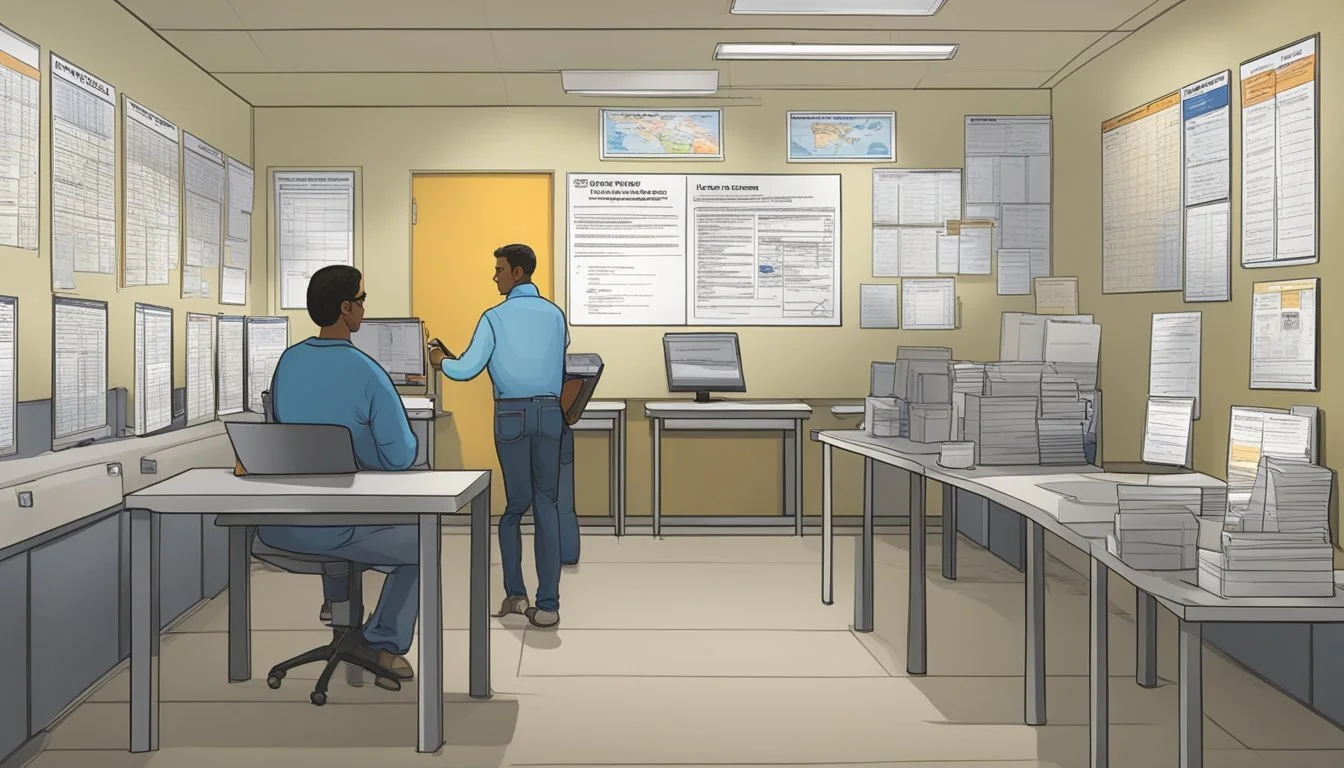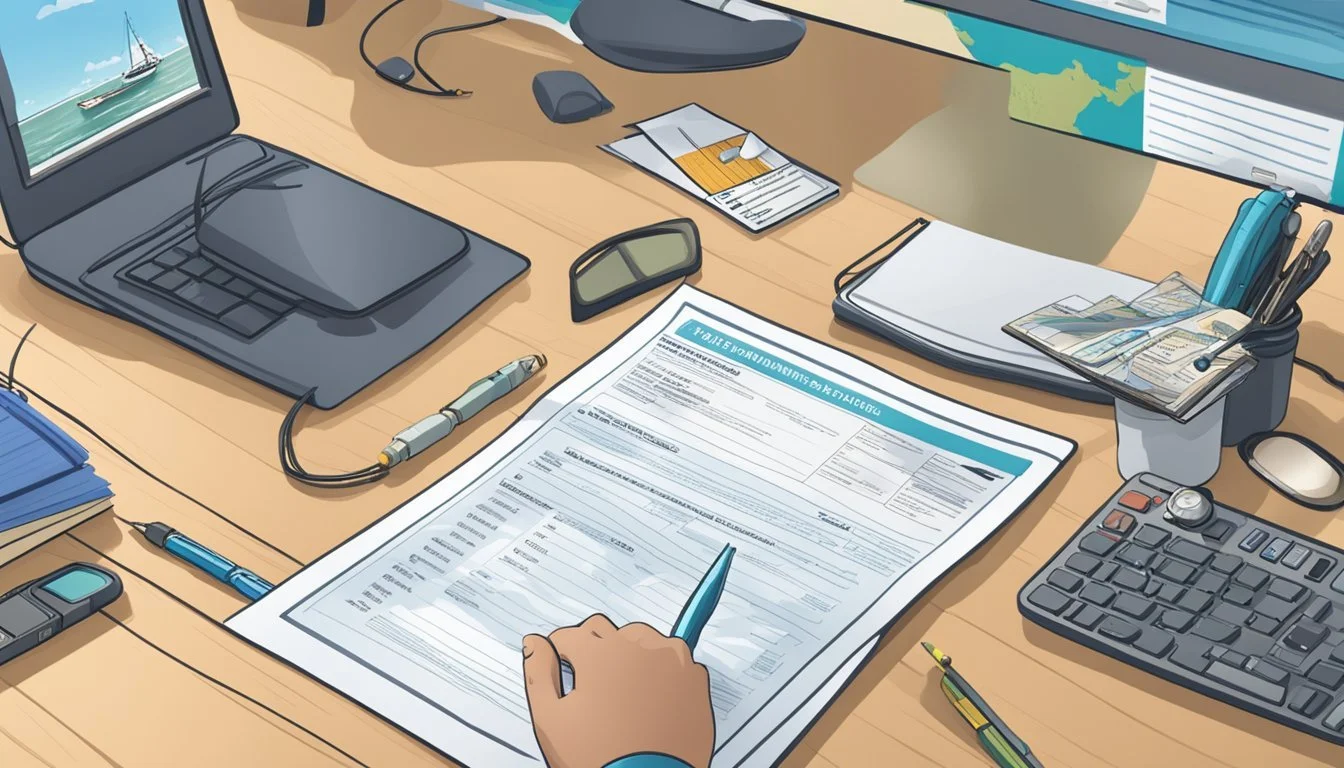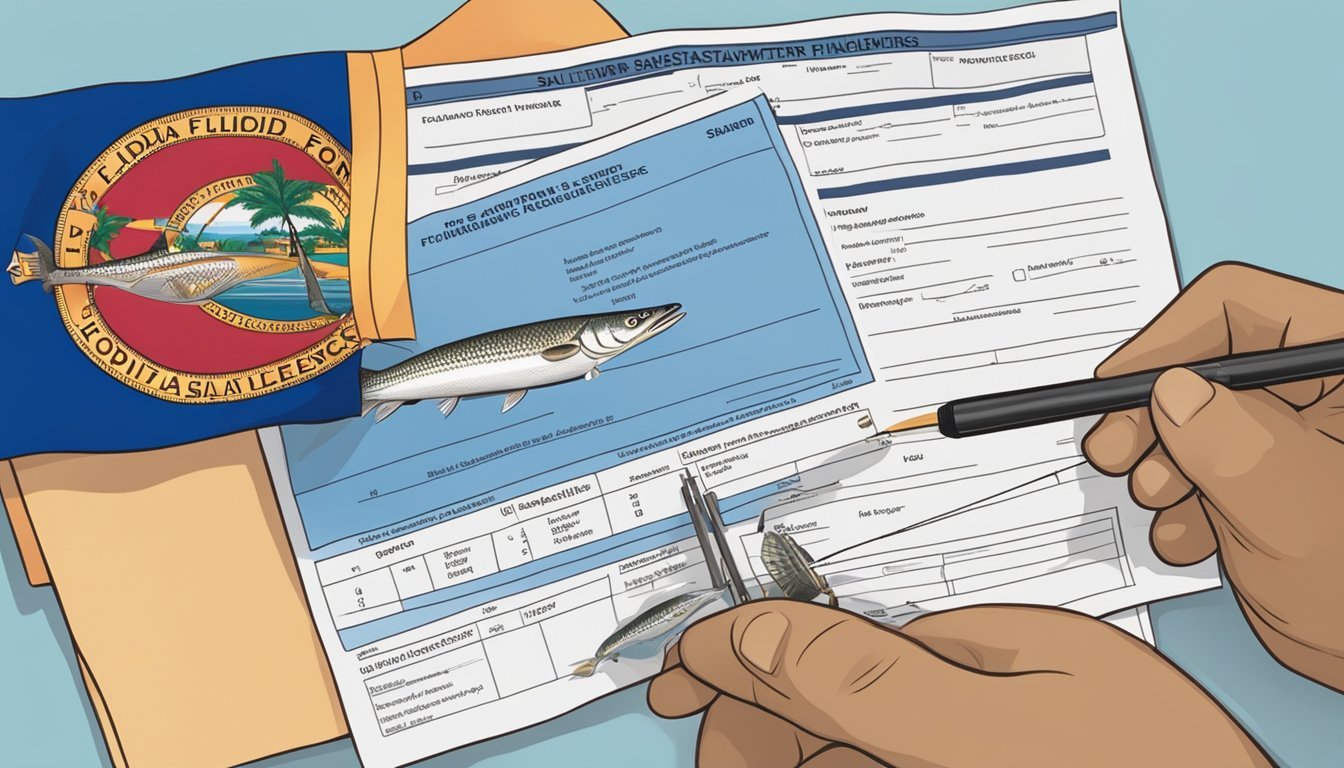How to Get a Florida Saltwater Fishing License
A Step-by-Step Guide
Fishing is a popular recreational activity in Florida, attracting both residents and visitors to experience the diverse marine life that the state's waterways offer. To fish (What wine goes well with fish?) in saltwater bodies within Florida, anglers are required to obtain a saltwater fishing license. This ensures that fish populations are sustainably managed, and contributes to marine conservation efforts. Licenses can be purchased through various channels, including online platforms, county tax collector offices, and licensed agents.
There are specific licenses and permits tailored to the kind of fishing an individual plans to engage in, such as the permits for targeting Snook or for those wishing to catch Spiny Lobster (What wine goes well with lobster?). In addition to the standard saltwater fishing license, certain species or activities, like the harvest of Snook, may require additional tags or permits. These regulations are in place to help protect sensitive species and ensure that the fishing practices remain sustainable.
Florida offers a range of licensing options, from short-term licenses for visitors to lifetime licenses for residents. Special accommodations are available for persons with disabilities, and the state also designates certain days as free fishing days, when anglers can fish without a license. Prospective anglers should check the latest requirements and guidelines to ensure they are in compliance with Florida Fish and Wildlife Conservation Commission (FWC) regulations before planning their fishing activities.
Understanding Florida Fishing Licenses
In Florida, anyone who wants to engage in saltwater fishing must acquire the appropriate license. There are different types of licenses available for residents, non-residents, and those falling into specific age categories.
Resident Licenses: Residents of Florida are eligible for yearly saltwater fishing licenses, offering a cost-effective solution for avid anglers. Special licenses, such as the Lifetime Saltwater Fishing License, include additional permits for Snook and Lobster.
Non-resident Licenses: Non-residents can purchase temporary or annual saltwater licenses. Prices vary, with options for three-day, seven-day, or annual licenses to accommodate the duration of their fishing activities in Florida waters.
License Types:
Annual Saltwater License: Required for residents and non-residents fishing from shore, boat, or structures attached to land.
Youth Licenses: Florida offers discounted licenses for younger anglers, ensuring that future generations can enjoy fishing.
Additional Permits: Targeted species like Snook and Lobster require additional permits, which can be included with certain licenses.
License Resident Non-resident Annual Yes Yes 7-Day No Yes 3-Day No Yes
It is important to note that freshwater fishing requires a separate license. Anglers should verify if their chosen location is saltwater or freshwater to ensure compliance with state regulations.
For convenience, a hard card version of the license is available. This is a durable, credit card-style document that costs an additional fee and is mailed separately.
Florida strives to maintain a balance between enjoying its natural resources and preserving them for the future. Therefore, understanding and adhering to licensing laws are pivotal for responsible fishing.
Types of Saltwater Fishing Licenses
In Florida, several types of saltwater fishing licenses cater to both residents and non-residents, ensuring that anglers can legally enjoy recreational fishing in the state's coastal waters.
Residents can choose from several options:
Annual Saltwater Shoreline License: This no-fee license allows Florida residents to fish from shore or a structure affixed to land.
Regular Saltwater Fishing License: For fishing from a vessel or watercraft away from the shore, residents need to purchase this license.
Youth Saltwater Fishing License: Although not required, youth under the age of 16 can acquire a license as a form of continued support for fishing regulations and conservation.
Senior Saltwater Fishing License: Residents over 65 can obtain a license, though it is not mandated.
Non-residents have the following options:
Seven-day License: Ideal for short-term anglers, this license covers all saltwater fishing activities for seven consecutive days.
Annual License: This is suitable for avid anglers who frequent Florida for saltwater fishing throughout the year.
Both residents and non-residents may select their licenses based on the duration of fishing activity planned in Florida's rich saltwater ecosystems. Frequent saltwater anglers or those planning extended stays might consider annual licenses for convenience and cost-efficiency. Meanwhile, occasional visitors could find seven-day licenses more appropriate for their needs.
Licenses are easily obtainable online, through county tax collectors' offices, or at licensed agents. Special permits may be required for targeting specific species such as snook, spiny lobster, or tarpon, so anglers should remain informed of the latest regulations to ensure compliance.
Eligibility and Requirements
Acquiring a Florida saltwater fishing license requires one to meet specific residency, age, and special status considerations. These qualifications are essential to understand before purchasing a license, as they determine the type and cost of the license needed for legal saltwater fishing in Florida.
Residency Requirements
Residents: Individuals who have lived in Florida for at least six consecutive months and claim Florida as their primary residence are eligible for resident licenses. Valid proof of residency, such as a Florida driver's license, may be required.
Non-Residents: Those who do not meet the residency requirements must purchase a non-resident fishing license to fish in Florida waters.
Age-Based Considerations
Youth: Florida law states that residents and non-residents under the age of 16 are not required to have a saltwater fishing license.
Seniors: Florida residents who are 65 years of age or older are eligible for a no-cost saltwater fishing license, but they must still obtain the license and carry proof of age and residency.
Military Personnel and Disabilities
Active Military: Active duty military members who are stationed in Florida but are not Florida residents may be eligible for reduced fee or complementary licenses.
Severe Disabilities: Florida residents with significant disabilities can apply for a no-cost saltwater fishing license, subject to proof and qualifications as per the Florida Fish and Wildlife Conservation Commission's regulations.
How to Purchase a Saltwater Fishing License
Securing a saltwater fishing license in Florida can be done through various convenient methods. Florida residents and non-residents have the facility to purchase an annual license online, via phone, or in person at designated locations, including retail stores like Walmart.
Online Registration
One can obtain a Florida saltwater fishing license promptly by registering online. The official Go Outdoors Florida website provides a comprehensive platform where both residents and non-residents can purchase different types of licenses. Android smartphone or tablet users can also download the Fish|Hunt App to manage their licenses and access additional resources like fishing times and regulations.
Residents may opt for an annual license.
Non-residents have options for different durations, ranging from three days up to an annual license.
To purchase online, applicants must:
Visit the Go Outdoors Florida website.
Create an account or log in to an existing one.
Choose the appropriate license based on residency status and desired coverage.
Complete the transaction with a payment method.
In-Person Locations
Purchasing licenses in person is possible at various locations throughout Florida. These include authorized retail stores such as Walmart, as well as county tax collector’s offices. Individuals can walk in and request a saltwater fishing license from the available options, whether for a resident or non-resident.
Walmart stores operate as one of the convenient places to purchase a license in person.
Tax offices may provide additional local services and regional information.
At in-person locations, individuals should:
Provide proof of identification and residency (if applicable).
Select the type of license required.
Pay the fee to receive the license on the spot.
Phone Registration
For those who prefer to purchase their license via phone, this method is a viable option. Customers will need to call the toll-free number provided by the Florida Fish and Wildlife Conservation Commission.
Have personal identification details ready.
Be prepared to pay with a credit or debit card over the phone.
By calling the designated number, one can:
Speak with a representative to discuss licensing options.
Choose the correct saltwater fishing license.
Complete payment to have the license issued.
Understanding Fishing Regulations
Before procuring a saltwater fishing license in Florida, it is crucial to be aware of the specific regulations that govern fishing activities. These rules are in place to ensure sustainable fishing practices and to protect the marine ecosystem.
Species-Specific Permits
Certain fish species in Florida waters require specialized permits due to their unique status or the particular management needs. Snook and spiny lobster are notable examples of species that are subject to stringent regulations. Anglers targeting these species must possess not only a standard saltwater fishing license but also additional permits, known as a Snook Permit and a Lobster Permit respectively. It is important to check for any changes in regulations or permit requirements prior to fishing.
Species Permit Required Regulatory Body Snook Yes – Snook Permit Florida Fish and Wildlife Conservation Commission (FWC) Spiny Lobster Yes – Lobster Permit FWC
Seasonal Restrictions
Seasons dictate the periods during which anglers can legally catch certain species. For instance, Florida enforces specific seasonal closures for snook and spiny lobster to coincide with their respective breeding seasons, ensuring populations remain healthy for future generations. Anglers should inform themselves on these timeframes, as they can vary annually.
Snook: Closed seasons typically occur from December 1st through the end of February and for the month of June on the Atlantic coast, and similar dates with slight variations on the Gulf coast.
Spiny Lobster: The regular season is from August 6th through March 31st, with a two-day sport season preceding it, usually at the end of July.
Protected Areas
Within Florida, there are numerous designated protected areas where fishing may be restricted or entirely prohibited. These include public wildlife management areas as well as special state reef fish angler designation zones. These regions are managed to conserve wildlife populations and habitat, necessitating anglers to respect any established restrictions. For fishing in these protected areas, anglers are often required to research the specific rules applicable, as they may differ significantly from general statewide regulations.
Public Wildlife Management Areas: They may have unique regulations, bag limits, and may require additional use permits.
State Reef Fish Angler Designation: Mandatory for those who intend to target certain reef fish species on state or federal waters.
It's essential for anglers to not only understand these regulations but also to keep abreast of any changes and updates. Compliance ensures the protection of Florida's fish populations and promotes ethical recreational fishing.
Additional Permits and Tags
While a general saltwater fishing license covers many activities, certain species require additional permits or tags due to their unique status or management needs. It is crucial for anglers to understand and obtain these specific permits and tags where necessary.
Snook Permit
Anglers targeting snook in Florida waters must have a Snook Permit. The Snook Permit is mandatory for anyone seeking to catch and keep this regulated species. These permits help manage the snook population and ensure sustainable fishing practices.
Lobster Combo
For those aiming to harvest lobsters, a Lobster Combo permit, which includes both the Crawfish and Snook permits, is required. This special permit allows individuals to legally harvest lobsters during the open season, supporting the management of this valuable resource.
Tarpon Tag
A Tarpon Tag is essential for anglers hoping to capture tarpon. The tag is a requirement if one intends to keep a tarpon at any time. The tag system assists in the monitoring and research of tarpon stocks, a catch-and-release species with only selective harvest allowed.
Shore-Based Shark Fishing
Individuals engaging in Shore-Based Shark Fishing need to obtain a specific permit. This permit is crucial as it helps manage shark populations and ensures that fishermen adhere to the conservation guidelines put in place to protect these marine animals.
Combination Licenses and Packages
Florida offers a variety of licenses and packages to anglers and hunters which provide convenience and cost savings for residents who participate in both hunting and fishing activities.
Hunting and Fishing Combo
For residents who enjoy both hunting and freshwater fishing, the Hunting and Fishing Combo license is a convenient option. It includes the privileges of both the Florida Resident Hunting License and the Florida Resident Freshwater Fishing License. This license allows residents to legally take part in these activities without the need for separate licenses, simplifying compliance with state regulations.
Gold Sportsman's License
The Gold Sportsman's License is designed for the avid Florida sportsman. It offers a bundled package that includes the benefits of several licenses:
Hunting,
Saltwater Fishing,
Freshwater Fishing,
Wildlife Management Area,
Archery,
Crossbow,
Muzzleloading Gun,
Turkey,
Florida Waterfowl,
Snook, and
Lobster.
This package is particularly suitable for deer hunters, turkey hunters, and those who wish to fish in both saltwater and freshwater. The Gold Sportsman's License is a comprehensive option that ensures a resident is licensed for a wide array of hunting and fishing activities throughout the state.
Renewing Your Saltwater Fishing License
When it comes time to renew a Florida saltwater fishing license, residents and non-residents can conveniently manage this process online. The Florida Fish and Wildlife Conservation Commission (FWC) provides a straightforward platform for renewals at GoOutdoorsFlorida.com.
Annual License Renewal: Licenses typically expire one year from the date of issue. Individuals should mark their calendars to renew their license promptly, avoiding any lapse that might disrupt their fishing activities.
Steps to Renew for Residents and Non-Residents:
Visit GoOutdoorsFlorida.com.
Log into your account or create one if you haven't done so.
Navigate to the license section and select the renewal option.
Florida offers an annual license renewal for both residents and non-residents, ensuring that anglers can continue to enjoy the state's vast saltwater offerings without interruption. It's important to note that fees may vary between residents and non-residents.
For residents who have yet to establish residency, typically a consecutive 12-month period is required.
Hard Card Upgrade: For those interested, Florida also provides the option to upgrade to a credit-card-style 'Hard Card' license during the renewal process. This durable option offers a more permanent alternative to the standard paper license.
Gathering the necessary information ahead of time will make the renewal process efficient. Users should have their current license number and personal identification ready. Once the renewal application is submitted and fees are paid, the process is complete, and individuals can return to fishing with assurance.
Special Considerations for Unique Florida Fisheries
When planning to fish in Florida’s diverse ecosystems, it is essential to be aware of specific regulations that apply to unique fisheries such as during Scallop Season and at Lake Seminole. These areas have particular mandates to ensure the sustainability and health of the fish populations.
Scallop Season
Duration: Typically, Scallop Season in Florida runs from early July to late September, although exact dates may vary each year based on assessments of the scallop population.
Locations: Specific regions open for scalloping include St. Joseph Bay, St. Marks, and the area extending from the Pasco-Hernando County line to the west bank of the Mexico Beach Canal in Bay County.
Regulations: Fishermen are required to adhere to the daily bag limits and possession rules that are designated for the respective areas. For example, in open regions, one may collect up to 2 gallons of whole bay scallops (What wine goes well with scallops?) in the shell, or 1 pint of bay scallop meat, per person per day.
Lake Seminole Fishing
License Requirements: Anglers must have a valid Florida Freshwater Fishing License to fish in Lake Seminole, even though the lake is shared with Georgia. Florida fishing licenses are honored for all waters of Lake Seminole.
Fish Species: Lake Seminole is populated with a diverse range of fish species, including largemouth bass, crappie, and catfish. They are subject to regulations such as size limits and catch limits to preserve the ecosystem.
Access Points: There are several access points for boat launching and shore fishing. Anglers should ensure they are on the Florida side of the lake when fishing, as regulations differ from the Georgia side.
By respecting the specific requirements of these fisheries, anglers contribute to the protection of Florida's natural resources while enjoying the rich fishing opportunities the state has to offer.
Fishing Without a License
Florida offers specific circumstances in which individuals can fish in saltwater without a license. It's important to be aware of these exemptions and special events to ensure legal compliance.
Exemptions and Free Fishing Days
Certain groups are exempt from needing a license for saltwater fishing in Florida:
Florida residents who are fishing from a structure fixed to land, such as a pier, bridge, dock, or jetty, can do so without a license.
Seniors who are residents of Florida aged 65 or older possess a Resident Senior Citizen Hunting and Fishing Certificate, thereby not requiring a license.
Children under the age of 16 are exempt from needing a fishing license.
Active-duty military members who are residents of Florida but are stationed outside of the state can fish without a license while home on leave.
Additionally, Florida designates certain days as Free Fishing Days where residents and nonresidents may fish in saltwater without a license. These days are perfect opportunities for those who don't fish frequently to experience fishing without the commitment of purchasing a license.
Penalties for Non-compliance
Fishing without a license outside of the exemptions and free fishing days can result in various penalties. Here's what one could face if caught without a license when required:
Fines: The cost can vary widely, with minimal fines for a first offense to much higher amounts for subsequent offenses.
Misdemeanor Charges: Repeat offenders may face misdemeanor charges, leading to a criminal record.
Suspension of Licenses: Florida can suspend or revoke fishing licenses for those who repeatedly violate the regulations.
Adhering to the licensing rules ensures both the preservation of Florida's fish populations and compliance with state law.
Educational Resources and Outreach
Florida's diverse saltwater fisheries are supported by comprehensive educational resources and outreach programs managed by the Florida Fish and Wildlife Conservation Commission (FWC). These initiatives are designed to foster responsible fishing practices and enhance the angling experience.
Conservation Programs
The FWC places a strong emphasis on conservation through programs that promote sustainable fishing. One key program is the State Reef Fish Angler Designation, which educates anglers on the importance of preserving Florida's reef ecosystems. In these programs, anglers learn about fish handling to ensure the health and survival of released fish. Additionally, there are publications and online resources available that provide detailed information on fish identification and marine habitats.
Fishing Workshops and Events
To encourage participation and education among new and experienced anglers alike, the FWC offers a variety of workshops and public events. These include:
Learn to Fish: Programs aimed at beginners that cover the basics of saltwater fishing.
Saltwater Fishing Tips: Educational materials and workshops that offer advanced insights for more successful angling.
Gone Fishing: A series of events and outreach activities that help to get people involved in fishing, emphasizing the enjoyment of the sport as part of a healthy, outdoor lifestyle.
Fishing Charter Educational Outings: Many fishing charters collaborate with the FWC to provide both recreational experiences and educational opportunities that teach the standards of responsible fishing.
License Benefits for Florida Residents
Florida residents enjoy several advantages when acquiring a saltwater fishing license. A resident fishing license grants them the legal right to harvest various saltwater species off the Florida coast, aligning with state regulations.
Fees and Permits: Resident annual licenses often come at a lower cost compared to those for non-residents. For specific catches like snook, residents can purchase an annual snook permit necessary for legally taking this popular game fish.
Types of Resident Licenses:
Annual Saltwater Fishing License: Allows year-round fishing.
Annual Snook Permit: Permits the catching of snook during open seasons.
Residents also have the option to apply for a lifetime license, which provides the convenience of not having to renew their license annually. It is a cost-effective investment over time for avid anglers.
Convenience: Residents can purchase their fishing licenses and permits through various means, including online platforms, by phone, or at physical locations such as county tax collectors' offices. This accessibility ensures that residents can easily integrate fishing into their lifestyle.
In summary, a Florida resident benefits from discounted rates, permission to snook fish with a resident annual snook permit, and the convenience of multiple purchasing methods. The state encourages residents to explore fishing by providing resources and opportunities tailored to their status as Floridians.
Frequently Asked Questions
In this section, readers can find succinct answers to common queries regarding the process of obtaining a Florida saltwater fishing license, with a focus on residency considerations and technical support for the application process.
Residency Switch Questions
Q: How does one update their residency status when applying for a Florida saltwater fishing license?
A: Individuals must provide proof of Florida residency through acceptable documentation such as a Florida driver's license or identification card. This documentation is necessary during the application process, and it can be submitted online, at a licensed agent, or at a county tax collector's office.
Q: What happens if someone has recently moved to Florida? When can they apply for a resident fishing license?
A: New residents are eligible to apply for a resident fishing license upon establishing proof of residency which typically requires living in Florida for at least six months and presenting the necessary documents confirming their residency status.
Technical Support Queries
Q: Who should be contacted if an individual experiences issues while trying to purchase their license online?
A: For any technical difficulties encountered during the online purchase, they should contact the toll-free Florida Fish and Wildlife Conservation Commission (FWC) helpline at 888-FISH-FLORIDA (888-347-4356) or seek assistance through the FWC's website under the licensing section.
Q: Is there technical support available for those who wish to purchase their Florida fishing license in-store but encounter problems?
A: Yes, if someone faces issues while attempting to purchase a license in-store at a licensed agent or tax collector's office, they should ask for immediate assistance from the staff. They can provide direct help or escalate the issue to the appropriate support channels.


